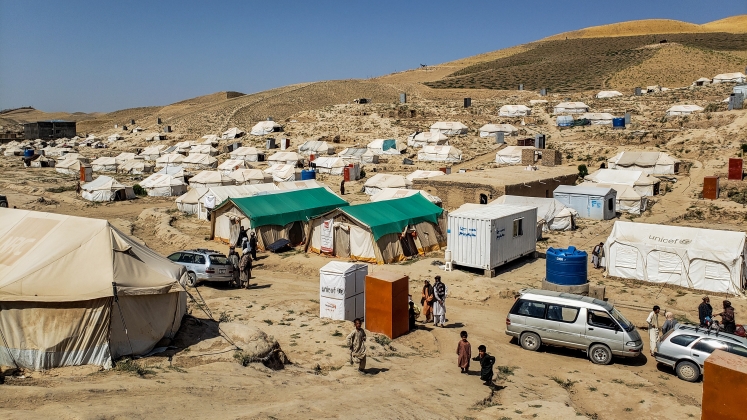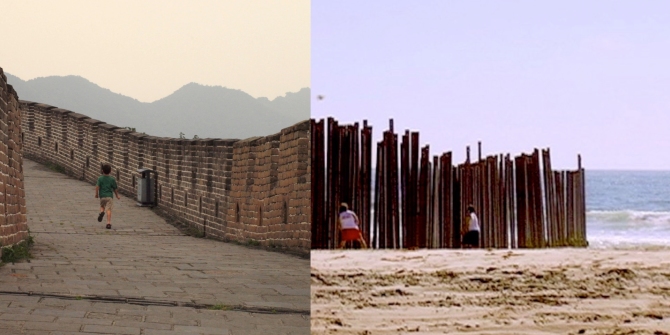 On Tuesday 30 April, the Phelan US Centre hosted the event “Is the Risk of Nuclear War Increasing?” with Dr Lauren Sukin (LSE Department of International Relations), Dr Fred Kaplan (Slate), and Professor Jeffrey Legro (University of Richmond). Annabelle Flood gives an overview of the event and the Q&A segment.
On Tuesday 30 April, the Phelan US Centre hosted the event “Is the Risk of Nuclear War Increasing?” with Dr Lauren Sukin (LSE Department of International Relations), Dr Fred Kaplan (Slate), and Professor Jeffrey Legro (University of Richmond). Annabelle Flood gives an overview of the event and the Q&A segment.
In a time of heightened geopolitical tension, on Tuesday 30 April, the panel event ‘Is the Risk of Nuclear War Increasing?’ chaired by the LSE Phelan US Centre Director, Professor Peter Trubowitz, brought together leading experts to discuss the dangers and risks of nuclear war amid increasing public awareness. Panellists included Dr Lauren Sukin, assistant professor of International Relations at LSE; Dr Fred Kaplan, Pulitzer Prize Winner, journalist at Slate Magazine and Phelan US Centre Visiting Senior Fellow; and Professor Jeffrey Legro, Visiting Professor at the Phelan US Centre, and International Relations specialist at the University of Richmond.
Professor Legro opened the conversation with a reference to his experience as an exchange student in Moscow, recalling the “air of fear” following Regan’s election in 1980. The risk of nuclear war was clear in the Cold War era; however, at present, shifts in the international system have left the level of risk ambiguous. He drew attention to two sources of danger: the sense of existential threat and organisational routines. Yet these dangers are not overly distressing because there is a “basic stability to the system that is always challenged, but stability comes from mutually assured destruction.” While this systemic stability is coupled with a historically strong nuclear taboo, he warned that the global nuclear order is showing signs of erosion. Longstanding nuclear agreements, especially between the US and Russia, are now plagued by a lack of transparency, which is cause for concern.
Dr Sukin offered compelling insight into major changes within the norms of nuclear politics, echoing Professor Legro’s mixed feelings on the topic. Renewed interest is based on the emerging trend of nuclear weapons becoming a means of statecraft. She presented the risks and benefits of nuclear proliferation but focused on observed deviations in policies of nuclear use. Looking at Russia, recent nuclear threats are not acts of deterrence but a display of expansionist behaviour. She argued that Russia, in an unprecedented manner, is violating international law by using its nuclear capability to challenge the landscape of the international order. Personalistic leadership within Putin’s regime has led to confusion about “what is, at best, a tool of maintaining the state, with maintaining their own power.” She concluded that as nuclear proliferation continues to increase the number of players in the game, we must reconceptualise deterrence theory from ‘deterrence through nuclear weapons’ to ‘deterrence from using nuclear weapons.’
Dr Fred Kaplan began by detailing the lack of consensus regarding the likelihood of nuclear war. Focusing on the significance of US alliances, he argued that Washington’s use of nuclear weapons would most likely occur in defence of allies. Yet, Trump’s careless disregard of historically strong alliances has led to nuclear proliferation, the outcome of which remains unknown. Kaplan subsequently questioned the credibility of nuclear deterrence, pointing to conversations in the Obama administration to declare a policy of ‘no first use’. The policy was rejected to maintain the security dependence of US allies, with the administration ultimately concluding that “if it is adding to your deterrence, why get rid of it?”
During the Q&A section of the event, topics included: the nexus between nuclear weapons and globalisation; prospects of nuclear use in the Russia-Ukraine conflict; and nuclear proliferation more broadly. In their closing remarks, the panellists concluded that continued proliferation would have far reaching implications; primarily, that the stability of nuclear deterrence was no longer assured. Yet, violating the nuclear threshold comes with a high price– an isolating effect that destroys credibility. While there was no unanimous agreement on the likelihood of nuclear war, it is important to note that analysis of nuclear use is almost entirely theoretical. As Dr Kaplan shrewdly stated, “it has always been a bit of theatre, this nuclear thing.”
- Listen to the event recording, ‘Is the Risk of Nuclear War Increasing?’ on LSE Player
- Featured image: Public domain, via Wikimedia Commons
- Please read our comments policy before commenting.
- Note: This article gives the views of the author, and not the position of USAPP – American Politics and Policy, nor the London School of Economics.
- Shortened URL for this post: https://wp.me/p3I2YF-dTL






